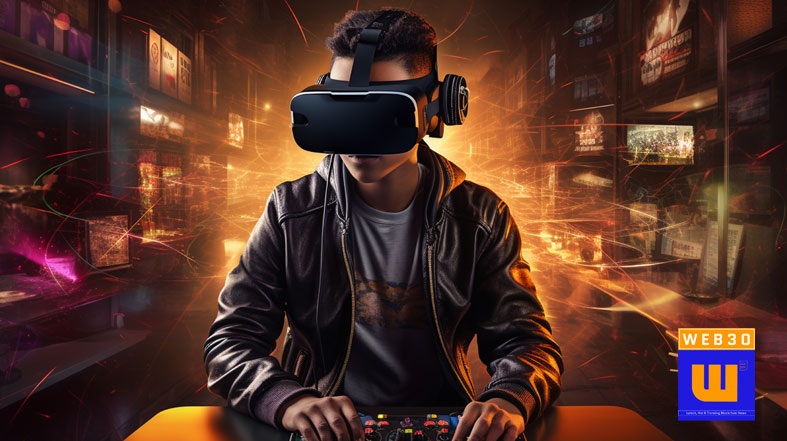The gaming world is undergoing a major transformation with the rise of Web3. Unlike traditional gaming setups, Web3 games offer players unique and decentralized experiences, enabling deeper engagement.
These games empower players by granting them more control and ownership over in-game assets like items, characters, and currencies. Players can trade, sell, or even create their own assets, adding a new dimension to their gaming experience.
Big players in the gaming industry have begun exploring these new realms to enrich player experiences. Gaming powerhouse Ubisoft, renowned for hit titles like Assassin’s Creed and Far Cry, led the way by integrating NFTs into its popular game Ghost Recon: Breakpoint.
However, despite the promise of Web3 games, they haven’t received widespread acceptance from the gaming community, which still favors traditional Web2 games. According to a report from the Blockchain Game Alliance, 51% of users cite player onboarding as the main challenge, while 37.2% highlight poor gameplay.
Major gaming companies like Ubisoft and Sega have slowed down their efforts to introduce new Web3 games, as they search for ways to achieve mass adoption. This comes as data from CoinGecko’s 2023 year-end report reveals that over 75% of Web3 games launched in the past five years have failed.
Nevertheless, the sector is projected to grow significantly, with forecasts predicting it to become a $30 billion industry by 2030. Sebastien Borget, co-founder of Sandbox and president of the Blockchain Game Alliance, shared insights into the industry’s evolution.
The adoption pattern suggests that large companies are waiting for smaller studios to lead innovations in the Web3 space before diving in themselves. Borget explains that smaller, more agile studios are better positioned to explore new revenue streams and adapt quickly to change, unlike their larger counterparts.
However, big players are not sitting idly. Companies like Nexon, Come2uS, Ubisoft, Atari, and G2A are venturing into Web3 and Blockchain Gaming, often through dedicated teams that operate independently.
One of the main challenges facing Web3 game development is the need to prioritize fun and gameplay over simply having a game. Efforts are underway to enhance player experience in Web3 games to match that of traditional Web2 games.
Another hurdle is user experience (UX), particularly the onboarding process, which involves setting up wallets and other steps perceived as complicated by users. Despite these challenges, there’s optimism that UX in Web3 will continue to improve.
While integration of blockchain technologies with major gaming engines like Unity and Unreal is progressing, distribution and player access remain obstacles for Web3 games to compete with current Web2 games. Middleware solutions like Stardust are helping simplify development complexities.
To attract traditional gamers to the Web3 gaming ecosystem, Borget suggests focusing on delivering fun gameplay and providing educational resources for onboarding. Larger platforms entering the space could also help simplify access to Web3 games.
NFTs and token economics play a crucial role in enhancing gameplay and player engagement in Web3 games. They enable players to become active stakeholders in the game’s success, fostering community-building and value creation.
Innovative applications of blockchain technology in gaming include using decentralized finance mechanics for accessing content and rewarding players with free assets through airdrops.
Expectations are high for major AAA gaming publishers like Square Enix and Sega to make moves in the Web3 space, following the footsteps of pioneers like Ubisoft. As the industry evolves, it promises to create an economy that empowers both players and developers, ushering in a new era of gaming.
Summary Review: The gaming industry is undergoing a significant evolution with the advent of Web3 technology. While traditional gaming setups have long dominated the scene, Web3 games are introducing novel experiences where players have more control and ownership over in-game assets. Despite initial hurdles and a cautious approach from major gaming companies, there’s a growing interest in exploring the potential of Web3. Smaller, more adaptable studios are leading the charge, while larger companies are gradually entering the space through dedicated teams. Challenges such as player onboarding and user experience persist, but efforts are underway to address them and improve the overall quality of Web3 games. Integration of blockchain technologies with popular gaming engines and the emergence of middleware solutions are further facilitating development. To attract traditional gamers to the Web3 ecosystem, the focus remains on delivering engaging gameplay and providing accessible educational resources. NFTs and token economics are enhancing player engagement by transforming them into active stakeholders in the game’s success. Looking ahead, expectations are high for major AAA gaming publishers to make significant moves in the Web3 space. As the industry continues to evolve, it holds the promise of creating an economy that empowers both players and developers, reshaping the gaming landscape for years to come.
Disclaimer: Remember that nothing in this article and everything under the responsibility of Web30 News should be interpreted as financial advice. The information provided is for entertainment and educational purposes only. Investing in cryptocurrency involves inherent risks and potential investors should be aware that capital is at risk and returns are never guaranteed. It is imperative that you conduct thorough research and consult with a qualified financial advisor before making any investment decision.





